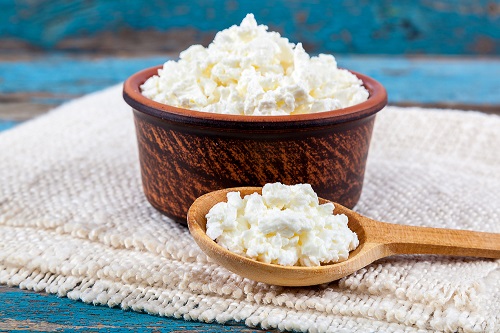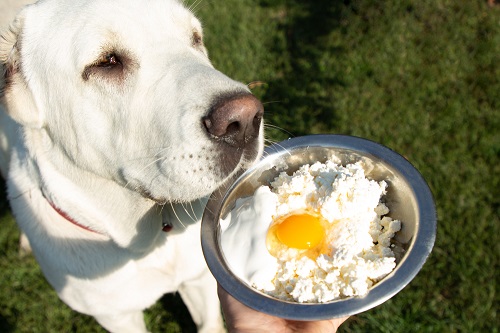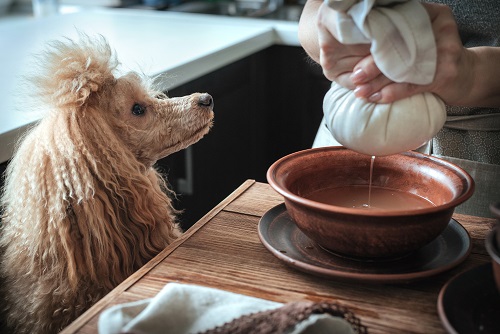Can Dogs Eat Cottage Cheese? Can it be a great dairy option for your pooch on a daily basis? Keep on reading to get the details!
Can Dogs Eat Cottage Cheese? Or should you avoid feeding it to them? Let’s have a look at all the pros and cons in detail.
What Is Cottage Cheese?

Cottage cheese is a type of cheese made from the curds of cow’s milk. It is a fresh cheese that has a mild flavor and a creamy texture. Most grocery stores sell cottage cheese in containers, and it is a popular high-protein, low-fat snack for people.
Cottage cheese can be eaten as a standalone food or utilized as an ingredient in various dishes, including dips, salads, and baked goods.
Can Dogs Eat Cottage Cheese ?
So, Can Dogs Eat Cottage Cheese? Yes, cottage cheese is safe for dogs to eat in moderation. Additionally, you should always choose plain, unsweetened cottage cheese with no added flavorings or ingredients, as some additives can be harmful to dogs.
Dog owners should only give cottage cheese to their dogs as an occasional treat and not make it a significant part of their diet, just like with any other human food.
Read here about Can Dogs Eat Feta Cheese | Is Feta Cheese Safe for Dogs
Health Benefits of Cottage Cheese for Dogs
- High in protein: Cottage cheese is a good source of protein, which is essential for building and repairing tissues in a dog’s body.
- Low in fat: Cottage cheese is a low-fat food, which can be beneficial for dogs that need to maintain a healthy weight.
- Rich in calcium: Cottage cheese is high in calcium, which is important for maintaining strong bones and teeth in dogs.
- Helps with digestion: The probiotics found in cottage cheese can aid in digestion and promote healthy gut bacteria in dogs.
- Can be used as a treat: Dogs who need to watch their weight or have food allergies can benefit from cottage cheese as a healthy and low-calorie treat option
A Few Health Concerns

While cottage cheese is generally safe for dogs to eat, there are a few health concerns to be aware of:
- Lactose intolerance: Some dogs may be lactose intolerant, which means they have difficulty digesting lactose, a sugar found in milk products such as cottage cheese. This can cause digestive upset, including diarrhea, gas, and bloating.
- High in sodium: Some brands of cottage cheese can be high in sodium, which can be harmful to dogs, particularly those with high blood pressure or heart disease.
- Potential for contamination: As with any human food, there is a risk of contamination with bacteria such as Salmonella or Listeria.
- Allergic reactions: While rare, some dogs may have an allergic reaction to cottage cheese. Signs of an allergic reaction can include vomiting, diarrhea, itching, and swelling.
Read here about Can Dogs Eat Cheesecake | Are Cheesecakes Good for Dogs?
How to Feed Your Dog Cottage Cheese?
If you decide to feed your dog cottage cheese, here are a few tips to keep in mind:
- Introduce it slowly: As with any new food, it’s important to introduce cottage cheese to your dog slowly and in small amounts. This will help to minimize the risk of digestive upset.
- Choose plain, unsweetened cottage cheese: Look for cottage cheese that does not contain any added sugar or flavorings, as these can be harmful to dogs. Plain, unsweetened cottage cheese is the best option.
- Limit the amount: Cottage cheese should be given to dogs in moderation, as it is high in protein and can be high in sodium. As a general rule, cottage cheese should not make up more than 10% of your dog’s daily diet.
- Serve as a treat or a topper: You can serve cottage cheese to your dog as a healthy and low-calorie treat or as a topper for their regular food. Adding a small spoonful of cottage cheese to their kibble can make it more appealing.
- Watch for signs of a digestive upset: If your dog experiences vomiting, diarrhea, or other signs of digestive upset after consuming cottage cheese, you should stop feeding it to them and consult with your veterinarian
Dogs Safe Cottage Cheese Recipe

Here is a safe cottage cheese recipe for dogs:
Ingredients:
- 1 cup low-fat plain cottage cheese
- 1/4 cup diced cooked chicken (optional)
- 1/4 cup diced sweet potato (cooked)
- 1/4 cup diced carrots (cooked)
- 1 tablespoon chopped parsley
Instructions:
- In a medium-sized mixing bowl, add the cottage cheese, diced chicken (if using), sweet potato, carrots, and parsley.
- Mix all the ingredients together until well combined.
- Serve immediately, or store in an airtight container in the refrigerator for up to three days.
- This recipe can be served as a standalone meal or as a topper for your dog’s regular food.
Can Dogs Eat Blue Cheese?
No, dogs should not eat blue cheese. Blue cheese is made from cow’s milk and contains a type of mold called Penicillium, which can be toxic to dogs.
Additionally, blue cheese is high in fat and sodium, which can lead to digestive upset, pancreatitis, and other health problems if consumed in excess.
Can Dogs Eat Cream Cheese?
Dogs can eat small amounts of cream cheese, but it’s not recommended as a regular part of their diet. Cream cheese is high in fat, calories, and sodium, which can lead to weight gain and other health problems if consumed in excess.
Additionally, some dogs may be lactose intolerant or have dairy allergies, which can cause digestive upset if they consume cream cheese or other dairy products.
Read here about Can Dogs Eat Caramel | Is Caramel Good or Bad for Dogs
Quick Takeaways
So, Can Dogs Eat Cottage Cheese? Yes. It is safe for dogs to eat in moderation. Do not give dogs cottage cheese with added sugar or flavorings, as they can be harmful. Introduce plain, unsweetened cottage cheese to dogs gradually and in small quantities.
